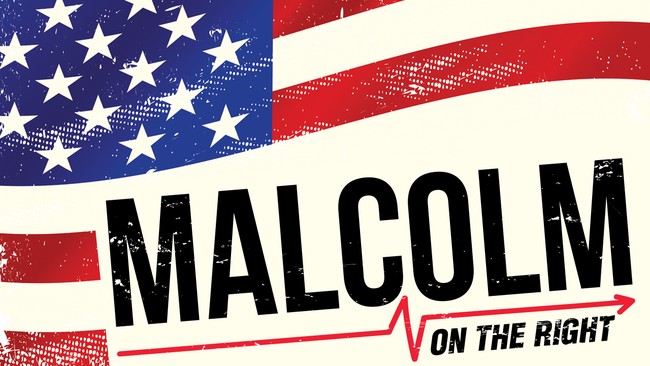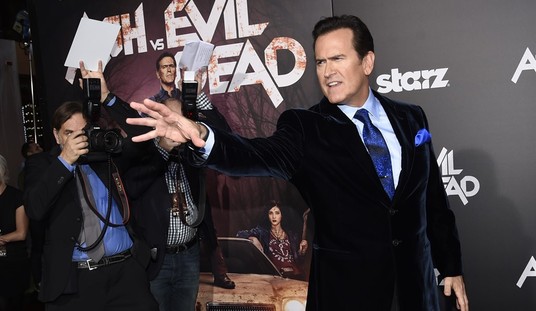As a revealing peek into the unappreciated scale and depth of U.S. intelligence-gathering systems, on his last day alive, Qassem Soleimani, Iran’s top general, was tracked on yet another terror-planning mission in Beirut, Lebanon, and then on his 90-minute, private-plane flight to Baghdad. There, he got into an SUV with Iran’s local militia commander.
They were unaware the car was being tracked in real-time.
Gen. Soleimani, you may recall, was responsible for the deaths of hundreds of American troops in Iraq, especially using his favorite IED tactic.
Donald Trump, then in the waning days of Term No. 1, was informed of the general’s movements. Without hesitation, he authorized the Iranian’s assassination.
Within minutes, two Hellfire missiles flew off the wings of a circling drone like the one above. Lockheed-Martin makes those weapons, and they do not miss. They were of the so-called Ginsu variety of Hellfires. Those are non-explosive. Instead, they deploy a whirling set of long blades.
These carved up the car and all occupants real good.
A huge international outcry erupted over an American president killing the military leader of Iran in a third country. All magnified by media eagerly seeking negative reactions from select sources.
Two years later, someone working in the Joe Biden White House — seems unlikely it was that dazed president himself — authorized the launch of a Ginsu Hellfire from another drone flying over Afghanistan.
There, Ayman al-Zawahiri, successor to Osama bin Laden as head of al Qaeda, was on his balcony as a Taliban guest in Kabul. As recorded by observers, Zawahiri was taking some early morning fresh air at the usual time and, as it happened, his last few breaths.
Not much outcry then. In fact, a notable amount of praise for settling another 9/11 score.
During his two terms, fellow Democrat Barack Obama, the man who stuck America with Biden, authorized 542 drone strikes that killed 3,797 alleged terrorists and an unknown number of nearby civilians. No great outcry then either.
Perhaps you, too, see a pattern here.
So, it was not terribly surprising this past week when Trump, now in the eighth month of Term No. 2, authorized the evaporation via missile of a gang's drug-laden boat and its 11 occupants off the coast of Venezuela.
"There's more where that came from," said the president, who has dramatically turned law enforcement’s old war on drugs into a new actual military war on drugs.
Cue the outcry.
On his Inauguration Day, Trump signed an executive order declaring drug cartels like Venezuela’s Tren de Aragua to be terrorist organizations and therefore subject to military action for national security.

He’s even put a $50 million bounty on Venezuelan dictator Nicolas Maduro, whom Trump says is behind that nation’s drug trade.
Gustavo Petro, the president of Colombia, home to outfits such as the Medellin drug cartel, called this Trump action "a murder anywhere in the world.” Then, he wheeled out the rhetorical violins for the deceased traffickers of death by drugs:
We have been capturing civilians who transport drugs for decades without killing them. Those who transport drugs are not the big narcos, but the very poor, young people from the Caribbean and the Pacific.
Not by accident, the high-speed drug boat’s sudden disappearance was captured on video and presented to Americans and other interested parties by Secretary of State Marco Rubio as a sign of the Trump administration's determination and as a warning to traffickers beyond.
https://t.co/o5xOQ6HRFg pic.twitter.com/s9ktAlDQUi
— Marco Rubio (@marcorubio) September 2, 2025
Even Vice President JD Vance joined the offensive.
To underline the threat, Trump posted on Truth Social:
The strike resulted in 11 terrorists killed in action. No U.S. Forces were harmed in this strike. Please let this serve as notice to anybody even thinking about bringing drugs into the United States of America.
Rubio added:
The president has said he wants to wage war on these groups because they've been waging war on us for 30 years and no-one has responded.
During a visit to South America, Rubio then announced the listing of two Ecuadoran gangs as foreign terrorist organizations subject to military action and suggested other countries will join the Trump administration’s drug offensive:
Those governments will help us find these people and blow them up. They might do it themselves, and we’ll help them do it.
Reality, of course, suggests that no matter any president’s admirable determination, illegal drugs and the mountains of money they reap will never be fully erased as long as domestic demand fuels the nation’s lucrative market. In fact, if enforcement does successfully reduce supplies significantly, cartel prices will increase.
While all the millions of illegal immigrants willfully admitted by Joe Biden’s political cartel will never be located and totally removed successfully, Trump is focused initially on deporting the criminals among them, many of them gang members. That's a very popular move.
The open border of the past four years allowed tons of cocaine and fentanyl, among other materials and undocumented foreigners, to flow across freely. Fentanyl overdoses alone cause about 100,000 American deaths per year, or one every seven minutes. About the time it's taking to read this.
The U.S. has 1,954 miles of border with Mexico. It is essentially closed now. Construction of the border wall is lengthening by the day.
This new, highly-publicized drug offensive using the military joins the president’s anti-crime offensive in Washington using the National Guard. Plus his threatened use of guard troops in other crime-ridden urban centers. Plus a wide range of other policy moves, such as banning federal money to states permitting cashless bail for accused criminals, who often quickly become repeat offenders.
This is what our HotAir colleague Ed Morrissey calls the president’s ongoing “cornering strategy” to help with next year’s midterm elections. Trump selects and ardently pushes aggressively addressing concerns such as the scourge of lethal imported drugs, deporting illegal immigrants, and fighting urban crime in the nation’s capital.
Unlike his predecessor, Trump is using the president’s bully pulpit and the media coverage that inevitably accompanies virtually anything a president does or says to highlight his positions popular among most Americans, according to polls.
And then the leaderless Democrats instinctively oppose him, painting themselves into a political corner supporting unpopular positions.
All of this recalls an incident in history in which a U.S. president acted unilaterally to end an international maritime threat far beyond the Caribbean.
For decades, pirates on the Barbary coast of North Africa took to seizing shipping and kidnapping passengers in the Mediterranean and holding both for ransom or sale into the African slave market.
The pirates operated out of the Barbary States, an area of North Africa that would become modern-day Morocco, Algeria, Tunisia, and Libya.
The pirates were essentially privateers who would prey on shipping of weaker countries and pay tribute to local rulers for protection.
For a number of years in the 18th century, as minister to France, secretary of state, and then president, Thomas Jefferson attempted to negotiate with those pirates or form a coalition of weaker powers to take them on. That failed.
So, faced with a lack of agreement and international inaction, in 1801, Jefferson had had enough. He unilaterally dispatched a squadron of U.S. Navy ships.
The Marines aboard then stormed ashore, burned a captured U.S. ship, eliminated the pirates, and freed their prisoners. The president’s decision solved that pirate problem at the time.
And it also produced the famous opening line of the Marine Hymn:
“From the Halls of Montezuma, To the Shores of Tripoli…”














